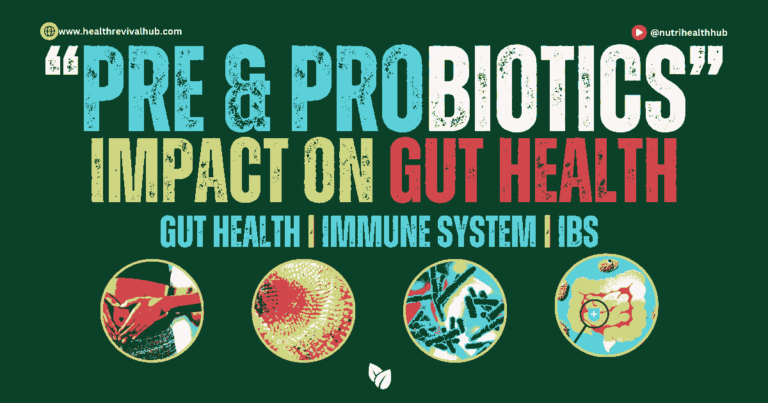Introduction: Impact of Prebiotic and Probiotic
The impact of prebiotic and probiotic on the immune system has become a focal point of modern health discussions. In today’s health-conscious world, understanding how these supplements influence our body can help us make informed decisions about our well-being. This blog aims to demystify these concepts for non-research audiences while highlighting their importance in maintaining a robust immune system.
What Are Probiotics and Prebiotics?
Probiotics are live microorganisms that confer health benefits when consumed in adequate amounts. These “good bacteria” reside in our gut and play a crucial role in digestion, nutrient absorption, and immunity (Nature Reviews Immunology). Common sources include yogurt, kefir, sauerkraut, and supplements. Research shows that probiotics like Lactobacillus rhamnosus GG activate the epidermal growth factor receptor (EGFR) pathway, reducing inflammation and protecting against colitis (Nature Reviews Immunology).
Prebiotics, on the other hand, are non-digestible fibers that serve as food for probiotics. They promote the growth and activity of beneficial gut bacteria. Foods rich in prebiotics include garlic, onions, bananas, and whole grains. Together, the impact of prebiotic and probiotic creates a synergistic effect known as the “gut-immune axis,” which supports overall health. Studies indicate that prebiotics like oligofructose reduce the recurrence of Clostridium difficile-associated diarrhea (Nature Reviews Immunology).
How Do Probiotics Influence the Immune System?
Probiotics interact with the immune system in multiple ways. One significant impact of prebiotic and probiotic is their ability to modulate immune responses. For instance, certain strains like Lactobacillus rhamnosus GG have been shown to activate the epidermal growth factor receptor (EGFR) pathway, reducing inflammation and protecting against colitis (Nature Reviews Immunology).
Moreover, probiotics can induce regulatory T cells (TReg cells), which help maintain immune tolerance. This is particularly important in preventing autoimmune diseases. Studies also suggest that the impact of prebiotic and probiotic extends beyond the gut, influencing conditions like atopic dermatitis and rheumatoid arthritis (Nature Reviews Immunology). Additionally, research highlights the role of Faecalibacterium prausnitzii, an anti-inflammatory bacterium, in treating Crohn’s disease (Nature Reviews Immunology).
The Role of Prebiotics in Immune Modulation
Prebiotics support the growth of beneficial bacteria, indirectly boosting immunity. A notable impact of prebiotic and probiotic is seen in their ability to increase bifidobacteria levels in the gut. For example, oligofructose has been shown to reduce the recurrence of Clostridium difficile-associated diarrhea (Nature Reviews Immunology).
Additionally, prebiotics like galactooligosaccharides enhance the diversity of the gut microbiota, which is linked to improved immune resilience. This highlights the profound impact of prebiotic and probiotic on maintaining a balanced gut ecosystem. Research also indicates that prebiotics can influence enterotypes, potentially modulating disease susceptibility (Nature Reviews Immunology).
Personalized Approaches to Probiotics and Prebiotics
Not all probiotics or prebiotics work the same way for everyone. Individual factors such as genetic background, diet, and existing gut microbiota composition influence the impact of prebiotic and probiotic. For instance, children delivered via cesarean section may benefit more from probiotic supplementation compared to those born vaginally (Nature Reviews Immunology).
This variability underscores the need for personalized approaches. Future research may enable tailored recommendations based on an individual’s unique microbiome profile, maximizing the impact of prebiotic and probiotic. Studies suggest that specific strains like Bifidobacterium infantis 35624 increase IL-10 production and TReg cell expression in healthy volunteers (Nature Reviews Immunology).
Potential Risks and Considerations
While the impact of prebiotic and probiotic is generally positive, there are potential risks. Some probiotic strains, like Lactobacillus plantarum v299, may cause tissue damage in healthy individuals (Nature Reviews Immunology). Similarly, administering probiotics during acute inflammation, such as in severe pancreatitis, can worsen outcomes.
Therefore, it’s essential to consult healthcare professionals before starting any supplementation. Understanding the impact of prebiotic and probiotic in different contexts ensures safe and effective use. Research also highlights the potential of postbiotics, like lactocepin, which degrade pro-inflammatory chemokines and protect against colitis (Nature Reviews Immunology).
Future Directions in Research
The field of probiotics and prebiotics is rapidly evolving. Researchers are exploring novel strains and their mechanisms of action. For example, Faecalibacterium prausnitzii, an anti-inflammatory bacterium, shows promise in treating Crohn’s disease (Nature Reviews Immunology).
Advancements in molecular diagnostics will further elucidate the impact of prebiotic and probiotic, paving the way for targeted therapies. As science progresses, we can expect more personalized and effective solutions for immune health. Studies also explore the role of spore-forming Clostridium clusters in inducing tolerant TReg cell responses, offering new therapeutic potentials (Nature Reviews Immunology).
Conclusion: Impact of Prebiotic and probiotics
The impact of prebiotic and probiotic on the immune system is undeniable. From enhancing gut health to modulating systemic immunity, these supplements offer numerous benefits. However, their effects vary among individuals, emphasizing the need for personalized strategies.
As we continue to unravel the complexities of the gut-immune axis, one thing remains clear: harnessing the impact of prebiotics and probiotics holds immense potential for improving human health. Whether you’re a health enthusiast or simply curious, incorporating these elements into your lifestyle could be a step toward better well-being.
Disclaimer: This blog post is an extract and simplified interpretation of a review article published in Nature Reviews Immunology. The original article can be accessed here.
References:
- Klaenhammer, T. R., Kleerebezem, M., Kopp, M. V., & Rescigno, M. (2012). The impact of probiotics and prebiotics on the immune system. Nature Reviews Immunology, 12(10), 728–733. https://doi.org/10.1038/nri3312
- Nature Reviews Immunology
Frequently Asked Questions:
Probiotics are live microorganisms that modulate the immune system and improve gut health by interacting with intestinal cells and microbiota. Prebiotics, as non-digestible fibers, nourish beneficial gut bacteria, enhancing their growth and activity. Together, their impact on prebiotic and probiotic supports digestion, reduces inflammation, and may lower risks of autoimmune diseases. Studies show they influence pathways like cytokine production and epithelial integrity.
Read More
Prebiotics stimulate the growth of beneficial bacteria, improving gut health and nutrient absorption. Probiotics reduce allergies, infections, and inflammation by modulating immune responses. Their combined impact of prebiotic and probiotic helps manage conditions like IBS and diarrhea. Certain strains like Lactobacillus produce anti-inflammatory compounds, offering protective effects against colitis.
Read More
Yes, probiotics maintain digestive health by balancing gut flora and preventing harmful bacteria overgrowth. Prebiotics support this by feeding beneficial microbes, ensuring their proliferation. This synergy strengthens the gut barrier, reduces inflammation, and alleviates symptoms of digestive disorders like IBS. The impact of prebiotic and probiotic is evident in studies showing improved gut resilience.
Read More
Combining prebiotics and probiotics creates a synbiotic effect, maximizing their impact. Prebiotics provide fuel for probiotics, enhancing their survival and activity in the gut. This combination improves microbial diversity, strengthens immune function, and protects against gastrointestinal issues. Research highlights their role in reducing inflammation and enhancing gut barrier integrity.
Read More

